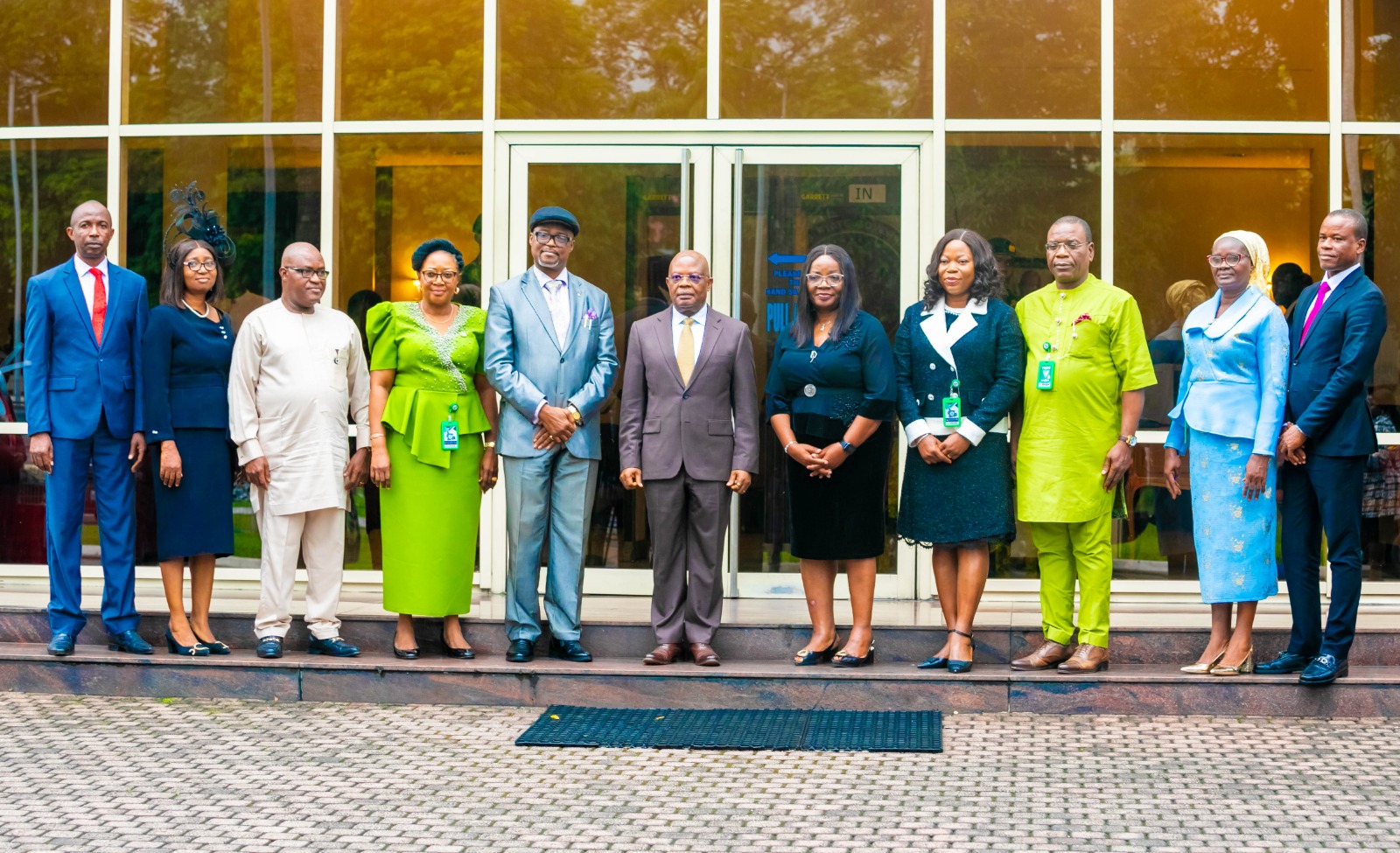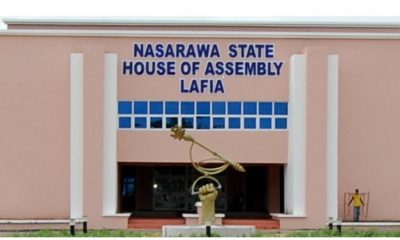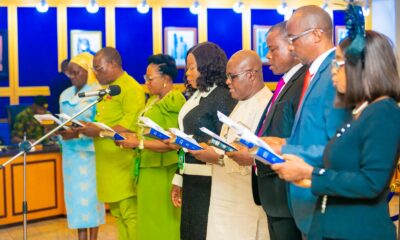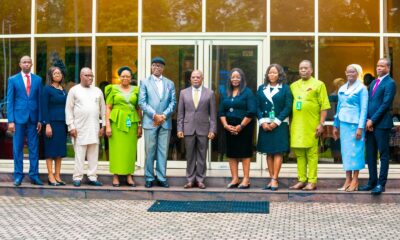Featured
IGP, Party Leaders Strike Deal On Peaceful Polls

Ahead of the 2023 general election, the Inspector General of Police (IGP), Usman Baba, yesterday, met with leaders of political parties in the country to pave the way for a crisis-free poll.
The meeting, which was held at the police force headquarters in Abuja, also had in attendance personnel from the military and security agencies.
The IGP said the meeting had become necessary following a noticeable trend within the national political space which, if not promptly addressed could evolve into a potent threat to not just our national security but the electoral process.
Baba, in his address at the meeting which later went into closed doors, noted that experiences of the past have shown that electoral violence both in the process leading to an election as well as the fall out of elections, has always constituted the most dangerous threat to our democracy.
He said the meeting was convened with the main agenda of engaging the political parties’ leadership on the perceived threats with a view to present a common front in addressing it in the overriding interest of our national security and democracy.
The IGP, while noting that violence goes beyond politicking, warned that “it is a crime that is well captured under extant criminal laws, both in its planning and execution.
He said “If political thugs are armed with any sort of weapons and inspired by any political actor to advance an illegal act including attacking innocent citizens for political purpose or attacking INEC assets and personnel or any other critical infrastructure in the country, such persons and those orchestrating them stand the risk of being brought to justice for the specific crime associated with their conducts regardless of their political affiliation, status, or ambitions”.
According to him, “Political violence manifests in three forms. First is violence that is targeted at the personnel and assets of the Independent National Electoral Commission (INEC) as recently witnessed in Ogun and Osunstates.
“The second form of political violence manifests in form of inter-party intolerance and violence which often become particularly pronounced during campaigns, elections, and post-election phases. It is on record that not less than 52 cases of such politically-motivated, intra and inter-party violence has been recorded across 22 states since the official commencement of campaigns for the 2023 General Election on September 28, 2022.
“The last form of political violence relates to the conduct of some state governors who manifest traits of political intolerance which often inflame political tension. In this regard, we have been receiving reports of some state governors who encourage political thugs and sub-national security outfits under their control to disrupt seamless and statutorily guaranteed campaign activities of parties or candidates with whom they hold opposing political views.
“In so doing, they deploy their powers and influences to either prevent the mounting of campaign billboards or pull them down, while also denying political opponents of spaces to undertake their campaigns or peaceful political congregations in contravention of the provisions of the Electoral Act 2022 (As amended).
He said: “Most of the recorded violent incidents or threats often result from political extremism, misinformation, intolerance, wrong political orientation, hate speeches, incitement, and, most importantly, the desperation of strategic actors within the political field who often place their parochial political ambitions over and above national security interests and our nation’s stable democratic order. Such actors, usually give a wrong direction to their party faithful, arm them, re-orient them and encourage them to resort to the use of threat, violence, and other extra-legal means to frustrate competing political parties and impose their own faulty perception of politicking.”
The IGP said: “Even more worrisome is the fact that just about a month ago, the aspirants in the 18 political parties publicly made a firm commitment to the nation to maintain peace and abide by rule of law and the Electoral Act in their political activities with the signing of the Peace Accord on September 29, 2022.
“To complement this, Mr President had at various global and national platforms openly affirmed his commitment to deepening our democratic journey by encouraging the virtues of a peaceful electoral process in which the interests and wishes of the electorates take pre-eminence. This ladies, and gentlemen, is the foundation of democracy, and a deviation from this standard can only engender chaos within the national security space and threaten our democratic heritage”.
The police boss said: “The emergency meeting of the Inter-Agency Consultative Committee on Election Security (ICCES) on November 29, 2022, is to address the issue of violence within the political space was extensively discussed and it was recognised that there was an urgent need to adopt an all stakeholders approach towards nipping the trend in the bud”.
He said: “In furtherance to this resolution, this meeting is, therefore, convened with the main agenda of engaging the political parties’ leadership on this trend and to present a common front in addressing it in the overriding interest of our national security and democracy. In so doing, I must clearly emphasise that violence goes beyond politicking; it is a crime that is well captured under extant criminal laws, both in its planning and execution.
“If political thugs are armed with any sort of weapons and inspired by any political actor to advance an illegal act including attacking innocent citizens for political purposes or attacking INEC assets and personnel or any other critical infrastructure in the country, such persons and those orchestrating them stand the risk of being brought to justice for the specific crime associated with their conducts regardless of their political affiliation, status, or ambitions”.
He said: “It is, therefore, important that this meeting should appreciate two critical things. First, a peaceful order remains paramount to the attainment of the political ambitions and interests of all political actors and their parties. They, therefore, owe it as a sacred obligation to themselves, their political parties, and the nation to alter their mind-sets and commit to providing leadership for their followers in a manner that will project peace and discourage violence, if indeed they are true democrats.
“Secondly, we should acknowledge the fact that political violence in any form, shape or manifestation is both an offence under the electoral act and a crime under extant criminal laws of the country. Beyond its impact on the political process, it also has a major consequence on our national security. Consequently, the Nigeria Police Force and all other national security agencies in fulfilment of their statutory obligations to the nation, remain duty-bound to initiate enforcement actions that will restore order within the political and national security systems”.
He said: “Henceforth, therefore, we shall put machinery in motion that will in the most proactive manner identify, isolate, apprehend, and bring any political actor and the foot soldiers they might be motivated to engage in violence at political rallies or any other political engagement to deserved justice. We have also resolved to emplace firm actions that will deter targeted attacks on INEC assets across the country. More than a stern warning, this is a clarion call for us all, both as security agencies and political actors to speak out with one voice in condemning political violence in overriding national security and democratic interests.
“On our part, and as an outcome of the ICEES meeting, the Nigeria Police Force working in collaboration with other security agencies have resolved to; enhance intelligence gathering, sharing and utilisation of same to stem acts of political violence; upscale the deployment of security teams to all INEC assets and facilities nationwide with teams drawn from the Police, Nigeria Army, Department of State Services (DSS), Nigeria Civil and Security Defence Corps (NSCDC) and the Federal Fire Service.
“Take decisive lawful action against purveyors of hate speech, incitement to violence, mobilisation of thugs and other violations including the prompt arrest, investigation, and prosecution of offenders in line with the provisions of Sections 92 and 93 of the Electoral Act 2022 as amended. Those already arrested will face prosecution. Despite all these initiatives, it is recognised that the leadership of each political party is critical in eradicating the menace of political intolerance, threat, violence and other negative tendencies in our democratic culture.
“This is because they are the strategic gatekeepers to our democracy whose conducts or misconducts do have a reverberating effect on the actions of their followers as well as on the national political space. It is for this reason that I wish to appeal to the leadership of all political parties here seated to be determined to show the right leadership virtues and publicly dissociate themselves from acts of political brigandage and violence as this is the only way we can reassure our citizens and the international community of our nation’s commitment to a peaceful 2023 General Election.
“I wish to similarly appeal to the Independent National Electoral Commission to, in cognisance of their critical regulatory, enforcement and supervisory roles as enshrined in the Electoral Act 2022, assert their statutory powers and scale up their compliance actions towards complementing the Nigeria Police and other law enforcement agencies in checkmating the threats being posed to our democratic order by actors within the political system.
“This requires that INEC should take decisive actions against candidates and parties that violate the Electoral Act in the areas of conduct of political parties, candidates, and other actors in relation to hate speeches; campaign funding regulations; encouraging, supporting, or inciting violence; and depriving political opponents of basic electoral rights guaranteed under the Act.
“On this note, I welcome you all to this meeting and look forward to an outcome that will address, in the most sustainable manner, the identified negative tendencies that are threatening our democratic process,” he said.
Featured
Rivers A Strategic Hub for Nigeria’s Blue Economy -Ibas …Calls For Innovation-Driven Solutions

The Administrator of Rivers State, Vice Admiral (Rtd.) Ibok-Ete Ibas, has emphasized the need for innovation-driven strategies, strategic partnerships, and firm policy implementation to fully harness the vast potential of the blue economy.
Speaking during a courtesy visit by participants of Study Group 7 of the Executive Course 47 from the National Institute for Policy and Strategic Studies (NIPSS) at Government House, Port Harcourt, on Monday, Ibas highlighted the importance of diversifying Nigeria’s economy beyond oil by leveraging maritime resources to create jobs, enhance food security, strengthen climate resilience, and generate sustainable revenue.
The Administrator, according to a statement by his Senior Special Adviser on Media, Hector Igbikiowubo, noted that with coordinated efforts and innovative solutions, the blue economy could serve as a catalyst for inclusive growth, economic stability, and long-term environmental sustainability.
“It is estimated that a fully developed blue economy could generate over $296 million annually for Nigeria, spanning fisheries, shipping and logistics, marine tourism, offshore renewable energy, aquaculture, biotechnology, and coastal infrastructure,” he stated.
“We must transition from extractive practices to regenerative, inclusive, and innovation-driven solutions. This requires political cohesion, intergovernmental collaboration, robust infrastructure, and institutional capacity—all of which must be pursued with urgency and intentionality,” he added.
Ibas urged sub-national governments, particularly coastal states, to domesticate the national blue economy framework and develop tailored strategies that reflect their comparative advantages.
He stressed that such efforts must be guided by disciplined planning, regulation, and investment to maximize the sector’s potential.
Highlighting Rivers State’s pivotal role, the Administrator outlined its strategic advantages as follows:
•Nearly 30% of Nigeria’s total coastline (approximately 853km)
•Over 40% of Nigeria’s crude oil and gas output
•More than 33% of the country’s GDP and foreign exchange earnings
•416 of Nigeria’s 1,201 oil wells, many located in marine environments
•Two of Nigeria’s largest seaports, two oil refineries, and the Nigerian Liquefied Natural Gas (NLNG) terminal in Bonny Island—one of Africa’s most advanced gas facilities
Despite these opportunities, Ibas acknowledged challenges such as pollution, coastal erosion, illegal oil refining, unregulated fishing, inadequate infrastructure, and maritime insecurity.
He reaffirmed his administration’s commitment to institutional reforms, coastal zone management, and inter-agency collaboration to build a governance structure that supports a sustainable blue economy.
“Sustainability must be embedded in our development models from the outset, not as an afterthought. We are actively exploring partnerships in maritime education, aquaculture development, port modernization, and renewable ocean energy. We welcome knowledge-sharing engagements like this to refine our strategies and enhance implementation,” he said.
He urged the NIPSS delegation to ensure their findings translate into actionable recommendations that address the sector’s challenges.
Leader of the delegation, Vice Admiral A.A. Mustapha, explained that the visit aligns with their strategic institutional tour mandate on the 2025 theme: “Blue Economy and Sustainable Development in Nigeria: Issues, Challenges, and Opportunities.”
The group is engaging stakeholders to deepen understanding of policy efforts and institutional roles in advancing sustainable development through the blue economy.
Featured
INEC To Unveil New Party Registration Portal As Applications Hit 129

The Independent National Electoral Commission (INEC) has announced that it has now received a total of 129 applications from associations seeking registration as political parties.
The update was provided during the commission’s regular weekly meeting held in Abuja, yesterday.
According to a statement signed by the National Commissioner and Chairman of the Information and Voter Education Committee, Sam Olumekun, seven new applications were submitted within the past week, adding to the previous number.
“At its regular weekly meeting held today, Thursday 10th July 2025, the commission received a further update on additional requests from associations seeking registration as political parties.
“Since last week, seven more applications have been received, bringing the total number so far to 129. All the requests are being processed,” the commission stated.
The commission revealed the introduction of a new digital platform for political party registration. The platform is part of the Party Financial Reporting and Auditing System and aims to streamline the registration process.
Olumekun disclosed that final testing of the portal would be completed within the next week.
“INEC also plans to release comprehensive guidelines to help associations file their applications using the new system.
“Unlike the manual method used in previous registration, the Commission is introducing a political party registration portal, which is a module in our Party Financial Reporting and Auditing System.
“This will make the process faster and seamless. In the next week, the commission will conclude the final testing of the portal before deployment.
“Thereafter, the next step for associations that meet the requirements to proceed to the application stage will be announced. The commission will also issue guidelines to facilitate the filing of applications using the PFRAS,” the statement added.
In the meantime, the list of new associations that have submitted applications has been made available to the public on INEC’s website and other official platforms.
Featured
Tinubu Signs Four Tax Reform Bills Into Law …Says Nigeria Open For Business

President Bola Tinubu yesterday signed into law four tax reform bills aimed at transforming Nigeria’s fiscal and revenue framework.
The four bills include: the Nigeria Tax Bill, the Nigeria Tax Administration Bill, the Nigeria Revenue Service (Establishment) Bill, and the Joint Revenue Board (Establishment) Bill.
They were passed by the National Assembly after months of consultations with various interest groups and stakeholders.
The ceremony took place at the Presidential Villa, yesterday.
The ceremony was witnessed by the leadership of the National Assembly and some legislators, governors, ministers, and aides of the President.
The presidency had earlier stated that the laws would transform tax administration in the country, increase revenue generation, improve the business environment, and give a boost to domestic and foreign investments.
“When the new tax laws become operational, they are expected to significantly transform tax administration in the country, leading to increased revenue generation, improved business environment, and a boost in domestic and foreign investments,” Special Adviser to the President on Media, Bayo Onanuga said on Wednesday.
Before the signing of the four bills, President Tinubu had earlier yesterday, said the tax reform bills will reset Nigeria’s economic trajectory and simplify its complex fiscal landscape.
Announcing the development via his official X handle, yesterday, the President declared, “In a few hours, I will sign four landmark tax reform bills into law, ushering in a bold new era of economic governance in our country.”
Tinubu made a call to investors and citizens alike, saying, “Let the world know that Nigeria is open for business, and this time, everyone has a fair shot.”
He described the bills as not just technical adjustments but a direct intervention to ease burdens on struggling Nigerians.
“These reforms go beyond streamlining tax codes. They deliver the first major, pro-people tax cuts in a generation, targeted relief for low-income earners, small businesses, and families working hard to make ends meet,” Tinubu wrote.
According to the President, “They will unify our fragmented tax system, eliminate wasteful duplications, cut red tape, restore investor confidence, and entrench transparency and coordination at every level.”
He added that the long-standing burden of Nigeria’s tax structure had unfairly weighed down the vulnerable while enabling inefficiency.
The tax reforms, first introduced in October 2024, were part of Tinubu’s post-subsidy-removal recovery plan, aimed at expanding revenue without stifling productivity.
However, the bills faced turbulence at the National Assembly and amongst some state governors who rejected its passing in 2024.
At the NASS, the bills sparked heated debate, particularly around the revenue-sharing structure, which governors from the North opposed.
They warned that a shift toward derivation-based allocations, especially with VAT, could tilt fiscal balance in favour of southern states with stronger consumption bases.
After prolonged dialogue, the VAT rate remained at 7.5 per cent, and a new exemption was introduced to shield minimum wage earners from personal income tax.
By May 2025, the National Assembly passed the harmonised versions with broad support, driven in part by pressure from economic stakeholders and international observers who welcomed the clarity and efficiency the reforms promised.
In his tweet, Tinubu stressed that this is just the beginning of Nigeria’s tax evolution.
“We are laying the foundation for a tax regime that is fair, transparent, and fit for a modern, ambitious Nigeria.
“A tax regime that rewards enterprise, protects the vulnerable, and mobilises revenue without punishing productivity,” he stated.
He further acknowledged the contributions of the Presidential Fiscal Policy and Tax Reform Committee, the National Assembly, and Nigeria’s subnational governments.
The President added, “We are not just signing tax bills but rewriting the social contract.
“We are not there yet, but we are firmly on the road.”
-

 Business16 hours ago
Business16 hours agoIndustry Leaders Defend Local Content, … Rally Behind NCDMB
-

 Politics13 hours ago
Politics13 hours agoNasarawa Speaker Advocates Conducive Executive/Legislature Relations
-
Niger Delta15 hours ago
Delta Leverages On Extensive River Networks To Drive Blue Economy
-
News14 hours ago
FG Renames University of Maiduguri After Buhari …As Tinubu Pours Encomiums On Late President
-
News15 hours ago
PCRC Dismisses Claims Of Police Strike As Fake, Mischievous
-

 News12 hours ago
News12 hours agoRivers PDP Debunks Sale Of LGA Election Forms
-
Niger Delta15 hours ago
Bishop Mocks Fake Prophecy Seekers … As Priests Relive Challenges At Ordination Ceremony
-
Rivers18 hours ago
Macobarb CEO Cries Out, Says No Indigenous Contractor Can Win Case Against NLNG Or Oil Majors in Nigerian Courts …As Justice Nwogu Throws Out Macobarb’s N5.74bn Claim








